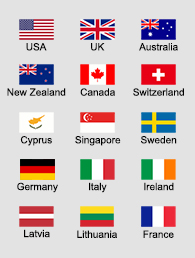The
university system IN UK
Higher education in Uk can be divided in to two groups: Private
Colleges and Universities
Again it can be divided in to Undergraduate and post graduate
studies. Undergraduate degrees are also known as "first degrees",
typically a BA (Bachelor of Arts) or BSc (Bachelor of Science).
Nearly 400,000 students entered UK institutions in 2004. The opportunities
have increased hugely in recent years as the British university
sector has expanded, giving today's students a wide variety of
choice, with over 50,000 different courses on offer. Degree courses
are available in hundreds of different subject areas, and universities
vary widely in size, facilities, accommodation, style and atmosphere.
Though entry to a university is competitive, UK Universities admit
students with a good first class or even high second class. It
is estimated that each year some 20% of students leave university
before completing their course, often because they are unhappy
with university life or with their choice of course. This can
be very costly, financially and emotionally, and in terms of lost
time and opportunity, but it can be avoided if you take time and
care over your choices.
Talentscan offers specialist advice to students who are looking
for guidance on their applications and who seek guidance on graduate
options and careers.
The university academic year generally begins in October and finishes
in June/July. The year is divided into three terms, with breaks
over the Christmas and Easter periods in December and April, although
some universities operate a semester system, where the academic
year is divided into two halves.
Entry requirements
Each university will specify which qualifications it will accept
and the minimum grades it expects applicants to achieve in those
qualifications. Often this information can be found on university
websites. It is also available on the UCAS
website (the Universities Central Admissions Scheme, which manages
all applications).
Proficiency in English
All applicants, whether British or overseas, are required to meet
a minimum level of English. This means a pass at grade C or above
in GCSE English Literature or a recognised equivalent. The preferred
qualification for those who have not studied in the British system
and whose first language is not English is the British Council's
IELTS.
Tuition :Home student or overseas student?
Most British universities and colleges of higher or further education
in the state sector have two levels of tuition fees depending
on the student's residential status. The higher fees are generally
referred to as overseas fees as distinct from home fees. The student’s
fee status for the duration of the course is fixed at the time
of admission.
What types of degree are available?
Most
undergraduates follow a three-year course (normally known as a
First Degree) which leads to a Bachelor of Arts (BA) or Bachelor
of Science (BSc) qualification. Some courses may include an additional
year for study abroad or for work experience (often known as sandwich
courses). Some universities offer extended undergraduate degrees,
completed in four years, which lead to a Masters degree (MA or
MSc), typically in Engineering (MEng). Many Scottish universities
have a similar four-year system.
Foundation degrees are two-year vocational courses which lead
to a qualification just below the level of an Honours degree (see
above). Some universities offer these and/or Higher National Diploma
(HND) courses. These qualifications can be used to go straight
into employment or can be extended by a year leading to a full
BA or BSc degree.
Some universities offer degree courses with extensive integrated
periods of work experience. These are called ‘sandwich courses’.
Many universities offer both part-time and full-time modes of
study. Part-time courses are usually completed in twice the time
it takes to complete a full-time course. International students
are permitted to study full time .Another, more limited option,
is to study for a degree through distance learning.
There is also a small group of private university colleges in
and around London which teaches within the American system. Some
of the degree programmes they offer are also accredited with the
British system.
Choosing your university
With well over 100 universities and colleges in the country offering
degree courses, the atmosphere, campus size, accommodation and
amenities vary enormously. There are also specialist institutions
such as colleges of medicine, art and agriculture. If you are
proposing to read any of these subjects, you should consider carefully
whether you wish to be in a specialist institution or at a full
university.





